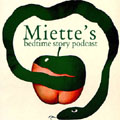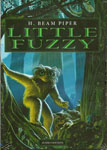
 Here’s a podcast that I’ve been listening to, on and off (mostly off), for years. Miette is a mystery to me and seemingly pretty much everyone else. She’s been putting out a weekly (or so) podcast since 2005 and yet we don’t know a lot about her. We know she loves to read short stories. That she’s got an accent people don’t easily pin down, and that she’s got a dog. Other than that…. well, we really don’t know.
Here’s a podcast that I’ve been listening to, on and off (mostly off), for years. Miette is a mystery to me and seemingly pretty much everyone else. She’s been putting out a weekly (or so) podcast since 2005 and yet we don’t know a lot about her. We know she loves to read short stories. That she’s got an accent people don’t easily pin down, and that she’s got a dog. Other than that…. well, we really don’t know.
What makes it all even more puzzling is that she’s an “obscurantist.”
Now I like the obscure, but she, well… she’s just out there – Miette has gone past the obscure and into the hinterlands of the truly odd. Every once in a while I want to throw her a lasso (or a lifeline) but I’m kind of afraid because she might pull me out there with her!
That sheer out-there-ness also makes me feel so normal. Miette’s the absolute omega to the omnivorous celebrity mainstream and me I’m just the guy who gets to say “sorry I don’t have TV” three or four times a week.
Perhaps Miette is from a parallel universe?
It would explain a lot.
Assembled below are some of the Miette-read tales that attracted me to her podcast. None of them are youur typical short story – most are experimental in some way, usually they’re at least odd, strange, or weird. The thing is though, these tales that I’ve picked here are the most centric of Miette’s stories!
SFFaudio interest:
Fun With Your New Head
By Thomas Disch; Read by Miette
1 |MP3| – Approx. 7 Minutes [UNABRIDGED]
The Cask of Amontillado
By Edgar Allan Poe; Read by Miette
1 |MP3| – Approx. 22 Minutes [UNABRIDGED]
The Assassination of John Fitzgerald Kennedy Considered as a Downhill Motor Race
By J.G. Ballard; Read by Miette
1 |MP3| – Approx. 7 Minutes [UNABRIDGED]
The Red Room
By H.G. Wells; Read by Miette
1 |MP3| – Approx. 7 Minutes [UNABRIDGED]
I See You Never
By Ray Bradbury; Read by Miette
1 |MP3| – Approx. 11 Minutes [UNABRIDGED]
How the World Was Saved
By Stanislaw Lem; Read by Miette
1 |MP3| – Approx. 11 Minutes [UNABRIDGED]
The Necrophil
By Felipe Alfau; Read by Miette
1 |MP3| – Approx. 40 Minutes [UNABRIDGED]
A story about a woman who dies too much.
The Yellow Wallpaper
By Charlotte Perkins Gilman; Read by Miette
1 |MP3| – Aprrox. 47 Minutes [UNABRIDGED]
The Ghosts
By Lord Dunsany; Read by Miette
1 |MP3| – Aprrox. 15 Minutes [UNABRIDGED]
On An Experience In A Cornfield
By Robert Sheckley; Read by Miette
1 |MP3| – Approx. 29 Minutes [UNABRIDGED]
The Judgment
By Franz Kafka; Read by Miette
1 |MP3| Approx. 30 Minutes [UNABRIDGED]
A World of Sound
By Olaf Stapledon; Read by Miette
1 |MP3| – Approx. 18 Minutes [UNABRIDGED]
The Ones Who Walk Away From Omelas
By Ursula K. Le Guin; Read by Miette
1 |MP3| – Approx. 20 Minutes [UNABRIDGED]
of Aural Noir interest:
A Letter to A.A. (Almost Anybody)
By Charles Willeford; Read by Miette
1 |MP3| – Approx. 29 Minutes [UNABRIDGED]
The Lost Soul
By Ben Hecht; Read by Miette
1 |MP3| – Approx. 29 Minutes [UNABRIDGED]
It Had To Be Murder
By Cornell Woolrich; Read by Miette
2 MP3s – Approx. 84 Minutes [UNABRIDGED]
Part 1 |MP3| Part 2 |MP3|
Podcast feed:
http://www.miettecast.com/feed/
iTunes 1-Click |SUBSCRIBE|
Posted by Jesse Willis


 Little Fuzzy
Little Fuzzy

